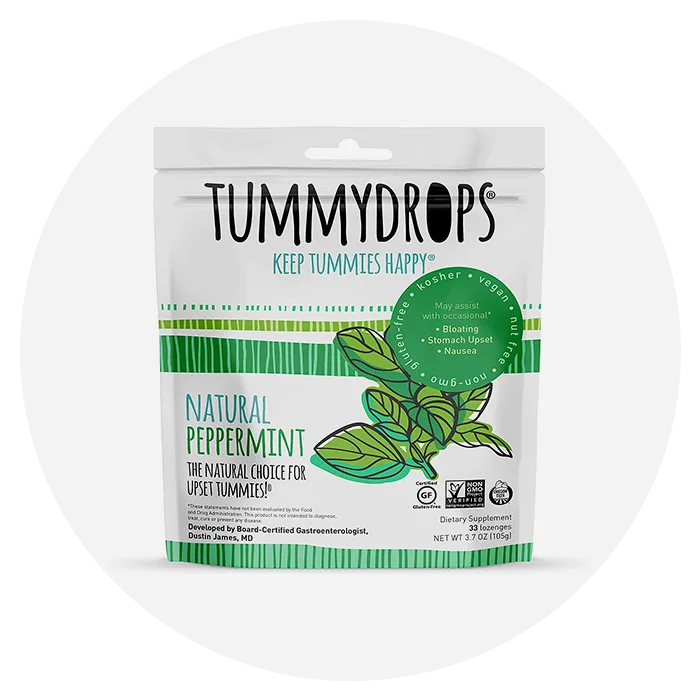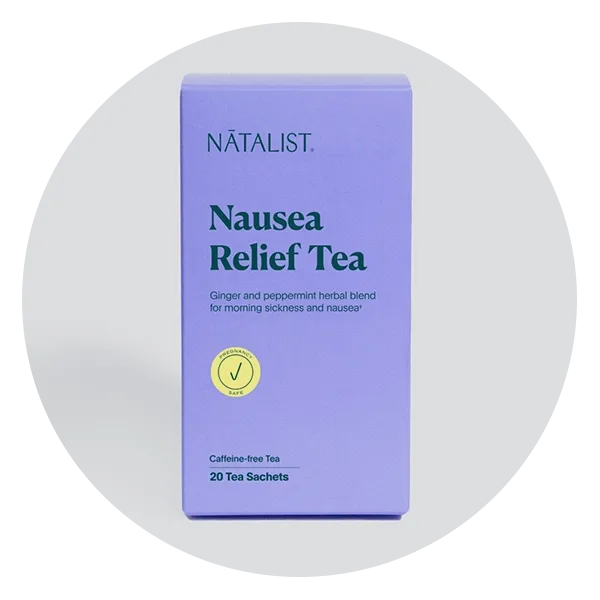The Best Morning Sickness Remedies, According to Parents
Morning sickness—which can actually strike at any time of the day or night—is a common complaint among moms-to-be. “About two thirds of women will experience nausea and vomiting during the first trimester,” explains Gil Weiss, MD, an ob-gyn in Chicago and Northbrook, Illinois. Unfortunately, frequent vomiting or perpetual nausea can cast a shadow over early pregnancy. The good news? It’ll likely fade after the first trimester. Better yet, you might be able to find some morning sickness relief now.
The truth is, fail-proof morning sickness cures don’t actually exist. But there are steps you can take and products you can use to help quell the queasiness. Certain foods, some lifestyle changes and a few over-the-counter medications can help. Ready to feel better and maybe even enjoy your pregnancy sans sickness? We’ve consulted a team of medical and nutritional experts to serve up information on morning sickness remedies that can work to stave off or curb the nausea. Read on for some smart ideas on how to treat morning sickness.
There are many natural remedies for morning sickness, including options you can buy online. We took the following steps to find the best store-bought options:
- We interviewed an ob-gyn and two dietitians that specialize in pre- and post-natal nutrition.
- We consulted research published by the National Library of Medicine.
- Because every pregnant parent’s experience is different, we performed extensive market research across message boards, forums and product reviews to see how these morning sickness remedies performed for moms across the country.
Editorial integrity is at the heart of everything we publish. Read about how The Bump develops and reviews all articles, including product reviews.
Sour pregnancy nausea candy
- Sour taste
- People love the lemon flavor
- Many people say they help ease nausea
- Some people say the candies sting the roof of their mouth
Made with plant extracts and essential oils, Preggie Pops promise instant relief from nausea. “I would not have survived my second pregnancy without Preggie Pops,” says mom of two Molly. “I highly recommend them to all moms with morning sickness and actually just gifted them to my daughters daycare teacher who is struggling right now,” continues Molly. The pregnancy nausea candies are a popular choice among a wide cross-section of The Bump community and come in five punchy flavors that help to take the edge off: sour raspberry, sour tangerine, peppermint, sour lemon and ginger.
Our community says:
I have the Preggo Pops. They do work. I don't like the suckers as much as the candies. The sour lemon and cherry ones are really good. - MeghanF13, The Bump forum member
I started taking Unisom before bed and one or two Preggie Pop Drops during the day. Everyone is different but it instantly stopped my nausea. - paperbirdlady, The Bump forum member
Preggie Pop Drops have always helped me. - littleyellowdragon, the Bump forum member
Peppermint pregnancy nausea candy
- Pleasant minty taste
- Organic ingredients
- Helps ease indigestion and nausea
- Expensive for candy
Next up is Tummydrops pregnancy nausea candy, an option that’s safe for the entire family. Formulated by a board-certified gastroenterologist, these individually wrapped lozenges naturally aid digestion and soothe upset tummies. Infused with pure peppermint oil, these invigorating candies have an intense minty flavor that’ll leave your breath nice and fresh.
Our community says:
I (luckily) didn't have crazy morning sickness—never threw up thank goodness! But I did have pretty bad food aversions and nausea. I found that mint was one of the only things that helped settle my nausea. I kept a bag of the mint Tummy Drops on me at all times and even just opening the bag to smell mint helped! - Danielle G., mom of one
Pregnancy nausea candy with vitamin B6
- Contains organic ginger and vitamin B6
- Mild but pleasant taste
- USDA-certified organic
- Some people dislike the smell of this candy
Studies show that vitamin B6 can help ease nausea and vomiting during pregnancy. Infused with both vitamin B6 and ginger, these little treats work to support digestion and help ease morning sickness. Better yet, they’re USDA-certified organic and free from gluten, preservatives, colors, soy and dairy. Best of all: When that queasy feeling kicks in, these lozenges will offer some sweet morning sickness relief.
Our community says:
Pregnancy candy with b6 in them. - knottiea2f06a02d7f6876c, The Bump forum member
Mint morning sickness tea
- Refreshing minty taste
- Only contains two ingredients
- Ginger flavor isn't overpowering
- Expensive
If you prefer to sip a hot beverage when nausea strikes, check out Nausea Relief Tea by Natalist. Designed specifically for pregnancy, this caffeine-free blend contains two simple, organic ingredients: Indian ginger root and Egyptian peppermint. It’s one of the best teas for morning sickness.
Our community says:
I also got some ginger candies from Pink Stork and some “morning sickness” tea from Natalist. - knottieb4de0d924aa12f36, The Bump forum member
Mint tea seems to help with the nausea. - knottie6a95a68bd50e1b91, The Bump forum member
Fruity morning sickness tea
- Fruity flavor
- Naturally caffeine free
- USDA-certified organic
- It doesn’t work for everyone
If you can’t stomach the strong taste of ginger or mint, this mild fruity tea might be a good option. The blend of naturally caffeine-free rooibos tea with lemon balm, peach, and papaya creates a light and refreshing taste. While the addition of organic ginger will help combat morning sickness symptoms. Pro tip: Many moms enjoy this tea served over ice.
Our community says:
I am 27 weeks pregnant and still have nausea and sickness. My morning sickness hit at 6 weeks on the dot and in my misery, I started googling remedies, desperate to feel better. I heard about "No to Morning Sickness Tea" somewhere online and I love that the ingredients are all natural. This gave me a lot of relief from my nausea and helped me feel human again! - knottie1ffca24082e480e0, The Bump forum member
Accupressure bands for pregnancy nausea
- Bands stimulate the P6 acupressure point
- Come with a carry case
- Easy to use
- Acupressure bands don't work for everyone
“Motion sickness sea bands work by stimulating the P6 pressure point,” says Weiss, who points to acupressure as an effective treatment for pregnancy nausea. This pair of wristbands by Frida Mom work by stimulating a pressure point on the inside of your wrists, and come highly recommended by moms.
Our community says:
Yes, I have had morning sickness during this pregnancy and my last pregnancy as well! I LOVE the Frida nausea bands, I felt they helped a lot. It was really in my first trimester and after that I was fine! - Rebecca T., mom of one
I put them on as directed first thing in the morning when I wake, any sickness I get is light and easy to manage compared to without. I also recommend using them with Preggie Drops or another remedy (even lemon water) for the nausea you might receive.- azure-iv, The Bump forum member
Hard to believe, but many morning sickness remedies can be found in the food aisle at your local grocery store. Here are some ideas for how to treat morning sickness with nutrition.
-
Eat foods that are rich in vitamin B6: According to Kipping, “the first line of ‘treatment’ for nausea is increasing foods high in vitamin B6 such as bananas, pistachios, oranges and chicken.”
-
Try cold food: To reduce nausea, Kilgore suggests pregnant people try eating cold foods, such as smoothies or yogurt and cool bubbly drinks like seltzer. Weiss adds that “colder foods have less odor, which makes them easier to tolerate than hot food.”
-
Load up on carbs: Snacks that are rich in carbohydrates (think: crackers, pretzels, dry toast and cereal) are easy to digest and keep down. Kipping recommends following this type of food with a source of protein, though, as “not eating enough protein, especially with your carbohydrates, could cause blood sugar spikes, leading to increased nausea.”
-
Eat small meals more often: Avoiding food altogether is a bad idea as it can make nausea worse. Kilgore suggests trying to eat smaller meals more frequently throughout the day to mitigate nausea and avoid having an empty stomach.
Sick and tired of being sick and tired? We get it. Sometimes adjusting your diet and lifestyle isn’t going to cut it, which is where other natural morning sickness remedies come into play. While there are no miracle cures, one (or more) of these options may help ease your symptoms.
-
Ginger. It’s a classic remedy for a reason—ginger works! Research shows that this ancient root is an effective and safe treatment for nausea and vomiting during pregnancy. Kilgore suggests incorporating ginger tea or natural ginger-ale into your diet to help alleviate symptoms. If you don’t like the taste, it’s also possible to buy ginger root capsules. Always consult your doctor before adding a new supplement to your regimen.
-
Acupressure. According to Weiss, acupressure bands can help relieve nausea by stimulating the P6 pressure point found on the inside of the wrist.
-
Aromatherapy: Just as certain smells trigger nausea, other scents can help alleviate it. “Try placing a cotton ball infused with essential oil, such as mint, lemon or orange under the nose,” suggests Kilgore. Kipping also recommends diffusing essential oils in the air or lighting a candle that smells good to help ease morning sickness symptoms.
-
Acupuncture: Studies have found that acupuncture is another effective alternative morning sickness treatment. Like acupressure, this therapy works by stimulating key pressure points on the body. In general, it’s considered safe in pregnancy; just make sure your practitioner knows you’re expecting and get the green light from your doctor beforehand.
If none of the above morning sickness remedies work for you, don’t be discouraged! According to Weiss, common over-the-counter medicine like the antihistamine Unisom or supplements like vitamin B6 capsules can help ease morning sickness and pregnancy nausea. “Sometimes a combination of two of these medicines can do the trick-like vitamin B6 and Unisom together,” adds Weiss. But it’s important to note that you should always consult your doctor before taking any over-the-counter medications while pregnant.
If you’re dealing with morning sickness in pregnancy, know that you’re far from alone: Two out of three women experience nausea and vomiting in their first trimester. Pregnancy hormones—like human chorionic gonadotropin (hCG)—peak in those early weeks, leading to this overall feeling of unpleasantness. What’s more, Weiss says that if you’re expecting twins or triplets, you’re more likely to experience morning sickness because of higher levels of hCG in your system. And, yes, while it’s called morning sickness, symptoms can ebb and flow throughout the day. The good news is that for most moms-to-be, symptoms diminish by the end of the first trimester or beginning of the second, says Chelsea Kilgore, RDN, a registered dietitian nutritionist at Weight Zen in New York City.
While it’s true that hormones are most likely causing your morning sickness, episodes can be triggered by different things around you. “Some people may be sensitive to certain odors, certain foods or may be going too long in between meals,” says Ryann Kipping, MPH, RDN, CLEC, founder of The Prenatal Nutritionist. Other factors—like humidity, excess saliva and hot environments—may aggravate nausea. “Laying down after a meal can also precipitate nausea and vomiting in pregnancy,” says Weiss.
While morning sickness is common and normally passes on its own, a small minority of women develop hyperemesis gravidarum (HG). According to Weiss, “HG is the most severe form of nausea and vomiting in pregnancy, and may lead to electrolyte imbalances that require in-hospital management and intravenous therapy.” If you start to lose weight or are sick more than three to four times a day, Weiss advises seeking medical attention immediately.
The biggest risk associated with morning sickness is dehydration. “In general, if you’re unable to keep down any food or water for 12 or more hours, a visit to the emergency room is recommended,” says Weiss.
Nevertheless, if you’re suffering from perpetual morning sickness, do what you can to get as much rest as possible, and remember that these symptoms won’t last forever. “If nothing seems to be working, and your day-to-day life has become increasingly challenging, contact your provider to discuss medication and other options,” advises Kipping. There are prescription morning sickness treatment options, and you can decide if this is the right route to take together.
About the author:
Martina Garvey is an editor at The Bump, where she writes and edits e-commerce content for pregnancy, postpartum and parenting. Over a nine plus year career in educational publishing and digital media, Martina has developed a keen eye for detail and robust reporting skills. As a staff member on The Bump for over four years, she leverages an in-depth knowledge of must-have baby gear and postpartum essentials alongside a passion for the latest trends to create informative content parents can trust.
Please note: The Bump and the materials and information it contains are not intended to, and do not constitute, medical or other health advice or diagnosis and should not be used as such. You should always consult with a qualified physician or health professional about your specific circumstances.
Plus, more from The Bump:
Gil Weiss, MD, is an ob-gyn at the Association for Women’s Health Care, serving women in Chicago and Northbrook, Illinois. Weiss attended medical school at Technion-Israel Institute of Technology in Haifa, Israel, and completed his residency at the University of Illinois in Chicago.
Ryann Kipping, MPH, RDN, CLEC, is the founder and CEO of The Prenatal Nutritionist. Kipping earned her degree in nutritional sciences at the University of Oklahoma and holds a master’s in public health from San Diego State University.
Chelsea Kilgore, RDN, is a registered dietitian nutritionist at Weight Zen in New York City. She specializes in pre- and postnatal nutrition and can be found on Instagram at @thepostpartum_nutritionist.
National Library of Medicine, The Effectiveness of Ginger in the Prevention of Nausea and Vomiting during Pregnancy and Chemotherapy, March 2016
National Library of Medicine, Acupuncture to treat nausea and vomiting in early pregnancy: a randomized controlled trial, March 2002
National Library of Medicine, Vitamin B6 is effective therapy for nausea and vomiting of pregnancy: a randomized, double-blind placebo-controlled study, July 1991
Navigate forward to interact with the calendar and select a date. Press the question mark key to get the keyboard shortcuts for changing dates.



























































